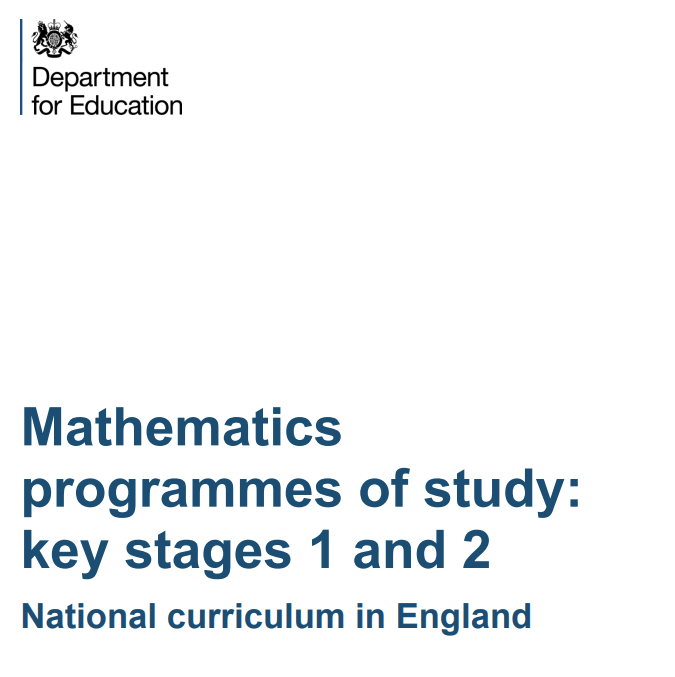Mathematics
Intent - What does the Maths curriculum intend to do?
At Blowers Green, our intent for mathematics is to teach a rich, balanced and progressive curriculum using maths to reason, problem solve and develop fluent conceptual understanding in each area. Our curriculum allows children to better make sense of the world around them by making connections between mathematics and everyday life. We aim to ensure that mathematics is a high-profile subject which children view positively and with a ‘Can do’ attitude. Our mathematics curriculum is designed to develop confident, resilient, and curious mathematicians who can apply their skills to real-life situations. We believe that a strong foundation in maths is essential for success in education and everyday life, and we aim to provide all pupils with the knowledge and skills needed to achieve their full potential.
Implementation – How is the maths curriculum implemented?
We believe that all children are entitled to a high-quality mathematics education which provides a foundation for understanding the world, the ability to reason mathematically and a sense of enjoyment and curiosity about the subject.
Our Approach to Teaching Maths at Blowers Green
At Blowers Green, our approach to mathematics is designed to develop fluency, reasoning, and problem-solving. We aim to nurture resilient, critical thinkers who apply mathematical understanding across real-life contexts and disciplines such as science, technology and geography.
We recognise mathematics as an interconnected subject, where pupils are supported to move fluently between different representations of ideas. Following the principles of mastery, our carefully sequenced and progressive National Curriculum-aligned programme (Dudley LA) enables all children to develop a deep, secure understanding of key concepts. The curriculum is structured around the domains of Number, Measurement, Geometry, and Statistics, and is underpinned by deep conceptual understanding, precise mathematical language, and critical thinking.
Mathematics at Blowers Green is engaging, challenging, enjoyable, and accessible to all. We adopt a Concrete–Pictorial–Abstract (CPA) approach, using manipulatives, diagrams, symbols, and numbers to help children explore and represent mathematical ideas clearly and effectively.
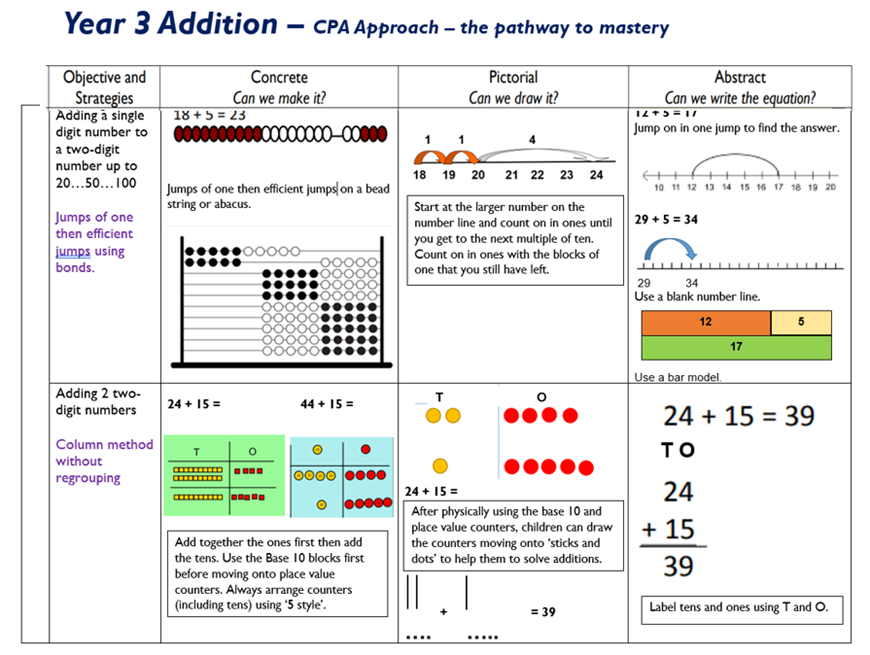
Early Maths at Blowers Green Primary
At Blowers Green Primary, we lay strong foundations for mathematical understanding from the very start. Our Early Years maths curriculum is carefully designed to give children the skills, language, and confidence they need to become curious, competent mathematicians.
We focus on six key areas that underpin early mathematical learning and form the basis for future progress:
- Cardinality and Counting – Understanding that numbers represent a quantity, or "how many" things there are.
- Comparison – Learning to compare groups and numbers to identify more, fewer, or equal amounts.
- Composition – Exploring how numbers can be broken down and combined (e.g. 5 is made of 2 and 3).
- Pattern – Recognising and creating patterns helps children spot relationships and build mathematical thinking.
- Shape and Space – Investigating shapes and their movement or combination supports spatial awareness and logical thinking.
- Measures – Comparing size, weight, capacity, and time prepares children for using standard units later on.
Children experience these concepts through practical, hands-on learning using real-life objects, purposeful play, and high-quality manipulatives. This supports our use of the Concrete–Pictorial–Abstract (CPA) approach, which ensures children develop strong number sense before moving on to more abstract ideas.
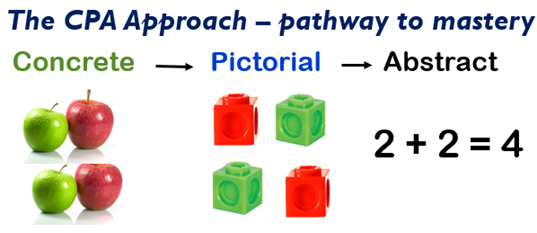
Mathematical language, reasoning, and problem-solving are embedded throughout the curriculum and across all areas of learning, enabling children to explore maths in meaningful, engaging contexts.
Our Maths Curriculum
We use the Dudley LA Progression in Mathematics and Yearly Overview of Learning to guide our planning. The curriculum is carefully sequenced to ensure new learning builds on prior knowledge. Each year is divided into six blocks per half term, with flexibility in pacing based on class needs.
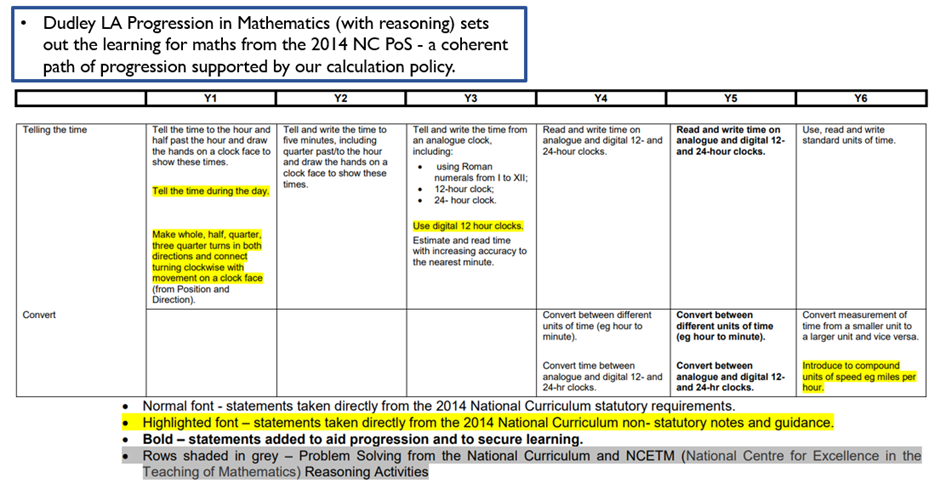
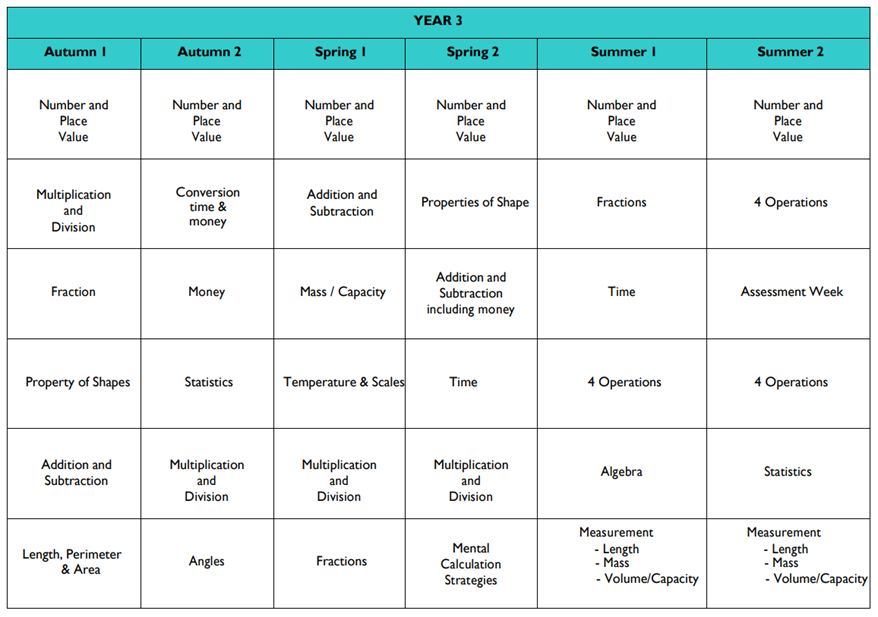
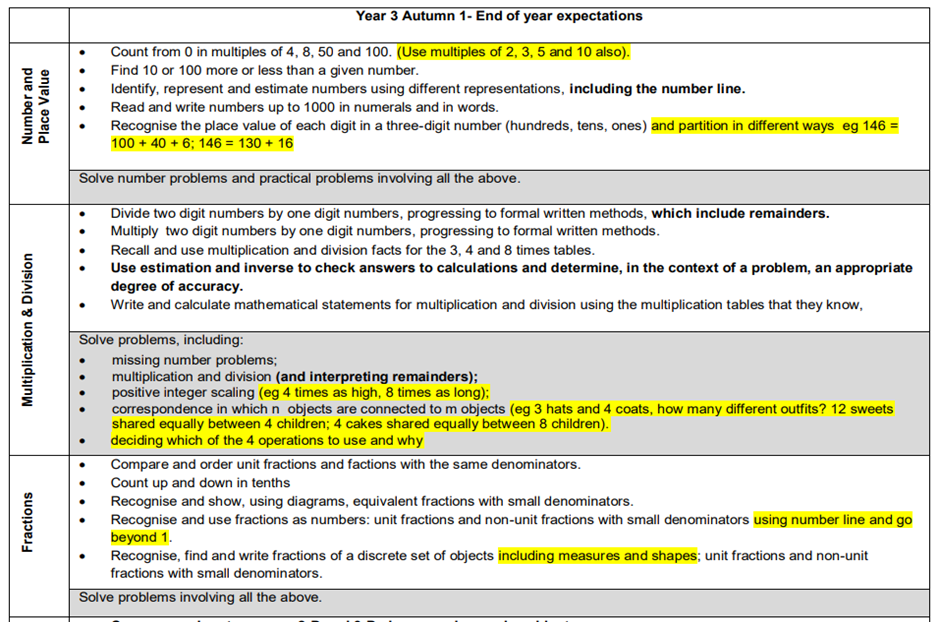
Teachers plan progression towards end-of-year expectations, using our layered KPIs (Key Performance Indicators) to support this. Each area of maths is revisited at least twice during the year to embed understanding. By allowing more time for each concept, we ensure learning is deep, secure, and sustainable.
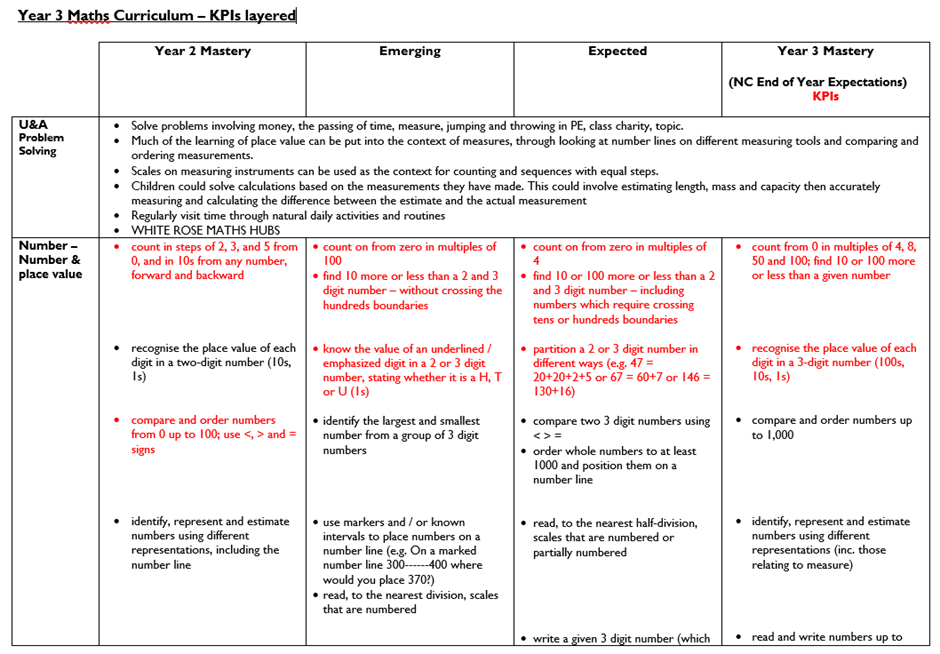
Maths lessons take place for 50 minutes daily across KS1 and KS2. In EYFS, lessons are delivered through shorter 15–20 minute sessions of input and continuous provision.
Maths lessons are characterised by the promotion of mathematical language, opportunities for purposeful collaboration, reasoning, and the consistent use of the Concrete, Pictorial and Abstract (CPA) model to ensure pupils develop a thorough understanding of the concepts being taught. The CPA approach - moving from the Concrete to Pictorial to Abstract representations - is a key part of the mastery approach to help all children develop a secure understanding of mathematical concepts.
- Concrete: Children begin with hands-on learning using real objects (like cubes or counters) to explore mathematical ideas.
- Pictorial: They then represent these objects with drawings or diagrams, helping them visualise the maths and bridge to more formal methods.
- Abstract: Once confident, children use numbers and symbols to solve problems, applying what they’ve learned in a more traditional written form.
This step-by-step approach ensures that children fully understand what they are learning, not just how to do it.
Where appropriate, lessons follow a six-part structure discovery, sharing of ideas, scaffolded practice, independent practice and reflection. This ensures that prior knowledge is revisited and built upon, concepts are broken down into manageable steps, and mathematical language is reinforced using models, images, discussion and ‘green box’ words (perimeter - distance around the outside of a shape, calculated by adding the length of all sides together).
At Blowers Green Primary, we recognise that a strong command of mathematical vocabulary is essential for success in maths. Our vocabulary progression, aligned with the National Curriculum and informed by the Oxford Vocabulary Framework, supports teachers in delivering clear and consistent language instruction from EYFS to Year 6.
The Oxford Vocabulary Framework, developed through extensive research by Oxford University Press, identifies key words pupils need to master. Our focus is on Tier 3 subject-specific terms (e.g., fraction, array, parallel), mapped by year group and maths strand for structured, age-appropriate teaching. These words are explicitly taught to ensure confident access to the curriculum.
We also include important Tier 2 high-utility words (e.g., compare, estimate) that help pupils interpret questions and communicate reasoning across subjects.
Vocabulary is organised by year and strand, with regular revisiting to reinforce understanding and ensure consistent coverage throughout the years.
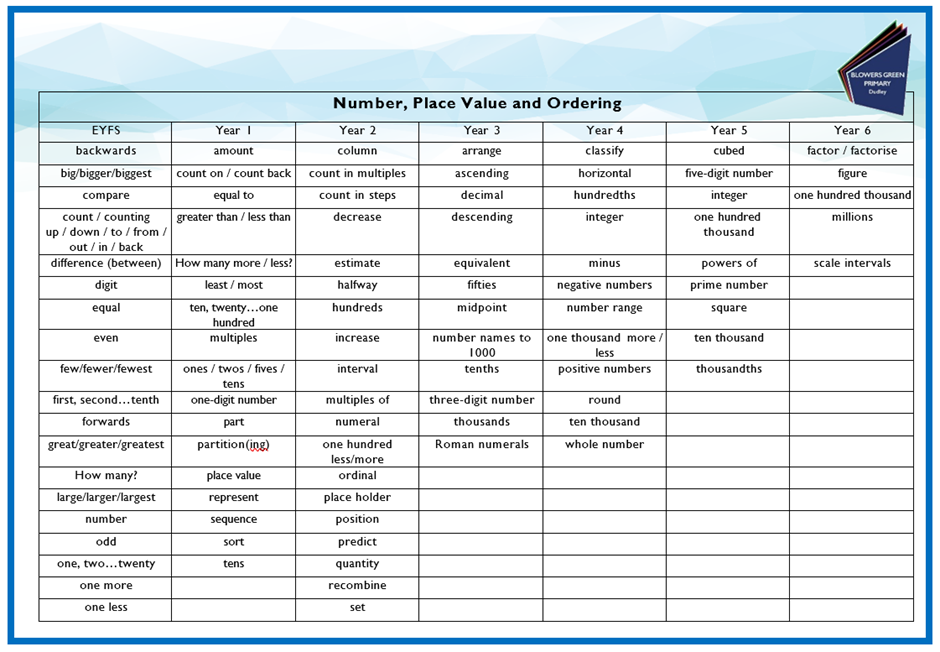
While the Dudley LA Progression in Mathematics and Yearly Overview of Learning forms the backbone of implementation, lessons and tasks are adapted to meet the needs of all learners and to gather evidence of pupils’ mastery in fluency, reasoning, and problem-solving.
Learning is demonstrated through independent tasks carefully designed to scaffold learning, encouraging pupils to work independently, dive deeper, make connections, and engage in creative problem-solving. This approach promotes high expectations, self-challenge, and pride in their work.
Strong mental arithmetic skills in counting, number facts, and strategies are essential for mathematical fluency. To develop this, Mental Arithmetic Practice (MAP) takes place four times a week from Reception to Year 6, building fluency, speed, and procedural understanding.
MAP is a whole-school approach to mental maths, developed by Anthony Reddy (former Senior Consultant for the National Numeracy Strategy) and Dave Godfrey (Accredited PD Lead with the NCETM). This flexible and engaging toolkit equips teachers with effective strategies—such as songs (Number Fun), stories, games, videos, and catchphrases—to help children embed a wide range of mental methods. It provides a consistent structure that enables pupils to choose and articulate the most efficient strategies when calculating mentally.
Number Bonds and Times Tables
Fluent computation relies on the rapid and accurate recall of number bonds to 20 and multiplication facts. The National Curriculum expects all pupils to recall all multiplication tables up to 12 × 12 by the end of Year 4.
At Blowers Green, we prioritise quick recall and understanding of multiplication facts, essential for success in primary maths. To support this, we run a Number Bonds and Times Table Challenge aligned with the expectation that by the end of Year 4, children recall multiplication and division facts up to 12x12.
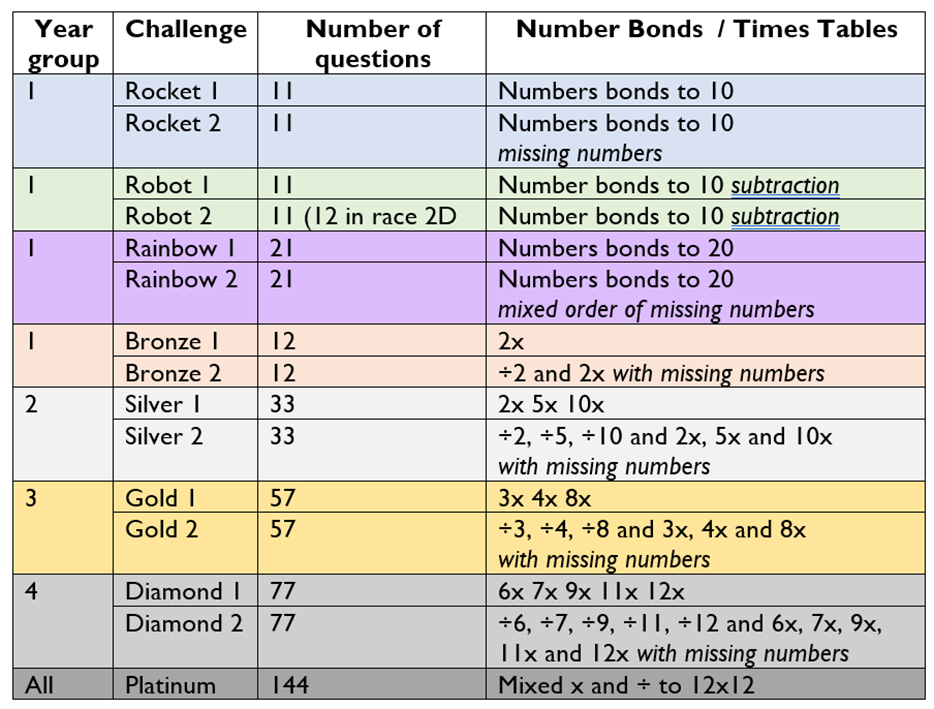
Children have up to 5 minutes to answer every question correctly. As they progress, they earn stickers, certificates, and challenge badges. The challenge is completed during maths oral and mental starters—fortnightly in Years 1, 2, 5, and 6, and weekly in Years 3 and 4. Progress is recorded and tracked using our Challenge Tracker. This helps to ensure that by the end of Year 2, children can confidently recall the 2, 3, 5, and 10 times tables. In Year 3, pupils build on this foundation by learning the 4 and 8 times tables, while continuing to strengthen their recall of previously taught facts.
Times Table Rock Stars and Numbots are regularly used from Reception to Year 2 (Numbots) and Year 2 to Year 6 (Times Table Rockstars). Although there are opportunities for children to use the resource in school, they are a key component of our home-learning offer, reinforcing declarative knowledge through weekly low-stakes but purposeful tasks.
- Times Table Rock Stars is used in Years 2 to 6 to support rapid recall of multiplication facts.
- Numbots is used from Reception to Year 2 to develop fluency in subitising, number bonds, addition, and subtraction.
Usernames and passwords are recorded at the back of each child's Learning Journal. Certificates are awarded in class, and top achievers and tournament winners are celebrated in the fortnightly newsletter The Sway and termly Blowers Green Bugle.

Each June, Year 4 pupils complete the online Multiplication Tables Check, which tests their recall of times tables up to 12 × 12. The check consists of 25 questions, with six seconds to answer each and a three-second gap between questions. The Sound Check activity on Times Table Rock Stars and this Multiplication Tables Check - Mathsframe activity mirrors this format, using the same rules and randomly generated questions. The children also enjoy playing Hit the Button - Quick fire maths practise for 6-11 year olds to practise recalling multiplication and division facts as well as number bonds and doubling and halving.
Supporting Our Maths Curriculum at Blowers Green
At Blowers Green Primary, we enhance our core maths curriculum with a wide range of high-quality resources. These support our commitment to providing engaging, challenging, and accessible maths lessons for all learners—from the early years through to Year 6.
These carefully selected materials help reinforce key concepts, develop fluency, and deepen mathematical thinking:
- Target Your Maths (Years 3–6): Structured exercises to build confidence and reinforce key skills.
- MAP (Mental Arithmetic Practice): A whole-school approach to developing speed, fluency and mental calculation strategies through regular, focused sessions.
- Number Fun: Interactive songs and activities that make learning maths enjoyable and memorable, especially in Early Years and KS1.
- NCETM (National Centre for Excellence in the Teaching of Mathematics): A trusted source of research-based strategies, planning tools and professional guidance.
- Numberblocks (EYFS): A BBC series used in Early Years to introduce number concepts in a fun, story-based format.
- Master the Curriculum: High-quality, mastery-aligned resources to support varied and purposeful practice.
- Classroom Secrets: Differentiated activities and challenges that help children apply their learning in different contexts.
- White Rose Maths (including Mastery and Mastery with Greater Depth): A well-established programme offering structured small-step progression to support deep understanding and challenge for all.
These resources are used flexibly by teachers to tailor lessons to the needs of the class, ensuring that every child is supported and challenged appropriately.
We also have a wide range of practical resources in school to support the teaching and learning of maths, with a strong emphasis on using manipulatives as part of the Concrete–Pictorial–Abstract (CPA) approach. These hands-on tools—such as counters, base ten blocks, number lines, and bead strings—help children develop a deep and secure understanding of number sense by allowing them to physically represent and explore mathematical concepts.
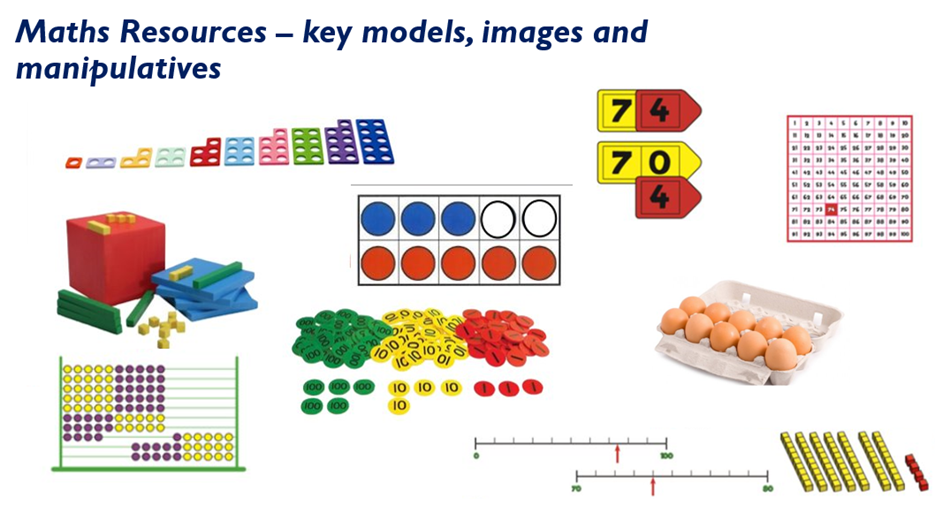
Using manipulatives supports pupils in making connections between ideas, strengthens their reasoning, and ensures they fully understand the 'why' behind the maths before moving on to pictorial and abstract representations. This approach builds confidence, supports all learners, and lays the foundation for long-term mathematical fluency and understanding.
Homework at Blowers Green Primary
Our homework is carefully designed to reinforce and build on what children have already learned in class. It focuses on problem-solving and applying calculation skills in real-life contexts, helping to address common misconceptions and errors observed during lessons.
- KS1: Homework is based on the Rapid Recall Boards and focuses on practice and rehearsal of number and counting key skills.
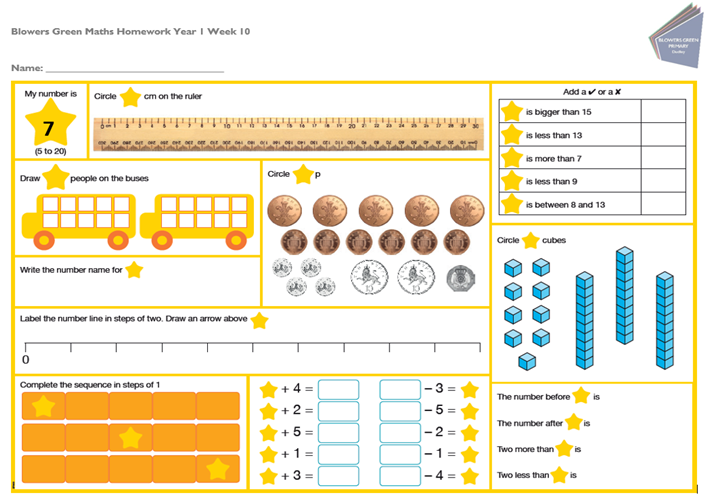
- KS2: Weekly homework tasks focus on consolidation of previously taught skills, ensuring children gain confidence through repetition.
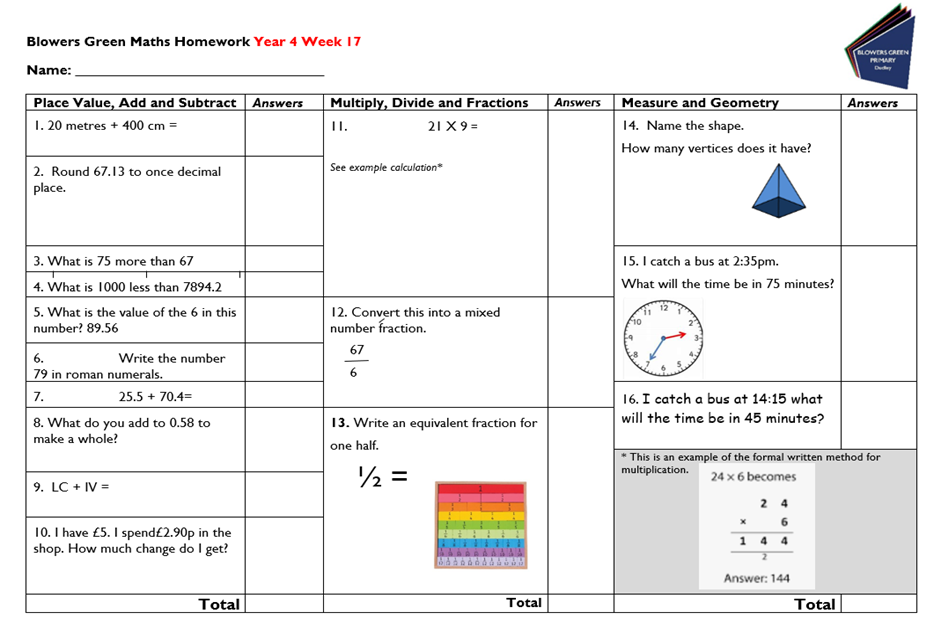
Homework is regularly reviewed and adjusted to provide additional practice where needed. Common misconceptions are also targeted during morning work sessions in school to support ongoing progress.
How We Measure Success in Maths at Blowers Green Primary
We track pupils’ progress in fluency, reasoning, and problem-solving across Number, Measurement, Geometry, and Statistics through:
- Fortnightly arithmetic assessments (our Maths Challenge which assesses declarative knowledge of addition, subtraction, multiplication and division facts) and termly summative assessments
- National assessments in Years 4 (MTC) and 6 (SATs)
- Coaching and mentoring, teach teaching and planning with the Maths Lead and Primary Coach and Mentor
- Lesson drop-ins and ‘book looks’
- Target setting and intervention based on ongoing assessment
- Conferencing and live marking to quickly identify misconceptions
Impact – What progress will children make?
At Blowers Green, our mathematics curriculum ensures that all pupils develop confidence, resilience, and a deep understanding of mathematical concepts. Through high-quality teaching and a mastery approach, pupils make excellent progress, enabling them to apply their mathematical skills fluently and effectively in a range of contexts. Children know that maths is a vital life skill that they will rely on in many areas of their daily life. Children have a positive view of maths due to learning in an environment where maths is promoted as being an exciting and enjoyable subject in which they can investigate and ask questions; they know that it is reasonable to make mistakes because this can strengthen their learning through the journey to finding an answer. Children are confident to ‘have a go’ and choose the equipment they need to help them to learn along with the strategies they think are best suited to each problem. Our children have a good understanding of their strengths and targets for development in maths and what they need to do to improve.
By the time pupils leave Blowers Green, they will have:
-
Fluency in Mathematical Concepts – Pupils will have a secure understanding of number, calculation, geometry, measures, and statistics, with the ability to recall key facts efficiently, such as times tables and number bonds.
-
Confident Reasoning Skills – Children will be able to explain their thinking, justify their answers, and use precise mathematical vocabulary to articulate their understanding.
-
Strong Problem-Solving Abilities – Pupils will apply their knowledge to tackle multi-step problems, demonstrating resilience, logical thinking, and perseverance.
-
A Deep and Secure Understanding of Maths – Through our mastery approach, pupils will not just memorise methods but truly understand mathematical concepts, allowing them to build upon prior learning with confidence.
-
The Ability to Apply Maths to Real Life – Pupils will recognise how mathematics is used in everyday situations and other subjects, preparing them for further education and practical applications beyond school.
-
A Positive Attitude Towards Maths – Our curriculum fosters enjoyment, curiosity, and confidence in mathematics, encouraging pupils to see themselves as capable mathematicians.
-
Readiness for Secondary School and Beyond – Pupils will leave with the skills and knowledge needed to transition smoothly into Key Stage 3, equipped for further mathematical learning and real-world problem-solving.
The impact of our mathematics curriculum is measured through formative and summative assessments, pupil engagement, and their ability to apply mathematical skills independently. By fostering a love for mathematics and ensuring a deep understanding, we prepare all pupils at Blowers Green for lifelong success in maths.
Aims of the Maths Curriculum
The national curriculum for mathematics aims to ensure that all pupils:
-
become fluent in the fundamentals of mathematics, including through varied and frequent practice with increasingly complex problems over time, so that pupils develop conceptual understanding and the ability to recall and apply knowledge rapidly and accurately.
-
reason mathematically by following a line of enquiry, conjecturing relationships and generalisations, and developing an argument, justification or proof using mathematical language
-
can solve problems by applying their mathematics to a variety of routine and non-routine problems with increasing sophistication, including breaking down problems into a series of simpler steps and persevering in seeking solutions.
Promoting Cultural Capital in Mathematics
At Blowers Green Primary School, we aim to broaden our learner’s understanding of the world through engaging and meaningful maths experiences. We promote cultural capital in maths by:
- Exploring Global Mathematics – Learning about mathematical concepts and contributions from different cultures and countries.
- Encouraging Community Involvement – Providing opportunities for students to use maths in local projects or charity initiatives.
- Introducing Mathematical Careers – Helping learners understand how maths is used in a wide range of careers, from engineering to finance.
- Providing Leadership Roles – Encouraging students to take leadership roles in maths challenges and competitions.
